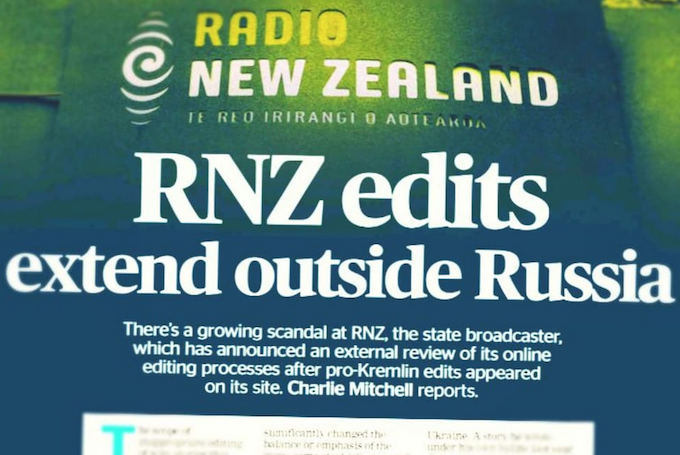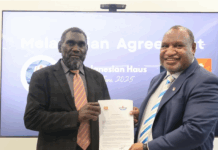By Colin Peacock, RNZ Mediawatch presenter
A review of RNZ’s online news has called for greater oversight and enforcement of standards after a crisis sparked by a single staffer making “inappropriate” edits to international news online.
RNZ Mediawatch asks RNZ’s chief executive if this was the result of a digital shift done on the cheap — and how he’ll put right what he himself called “pro-Kremlin garbage”.
“An RNZ digital journalist has been stood down after it emerged they’d been editing news stories on the broadcaster’s website to give them a pro-Russian slant,” host Jeremy Corbett told 7 Days viewers back in June when the story first hit the headlines.
- LISTEN TO RNZ MEDIAWATCH: Putting right what went wrong
- READ MORE: Other RNZ “Russian edits” crisis reports
“You’d never get infiltration like that on 7 Days. Our security is too strong. Strong like a bear. Strong like the glorious Russian state and its leader Putin,” he said.
It’s never good for a serious news outlet when comedians are taking aim.

It was just a joke of course, but at the time some wondered whether Kremlin campaigns could have been behind the unapproved editing of RNZ’s online world news.
Pro-Russian perspectives and some loaded language inserted into news agency stories relating to the war in Ukraine were first spotted overseas.
RNZ chief executive Paul Thompson called it “pro-Kremlin garbage” and some politicians asked if RNZ might be carrying foreign propaganda.
RNZ tightened editorial checks and stood down one online journalist, who later resigned. He told RNZ Checkpoint that he had edited news reports “in that way for years” and no one had ever queried it or told him to stop.
An RNZ audit of stories he edited eventually discovered 49 — mostly supplied by Reuters — which RNZ deemed to be inappropriately edited.
External experts were then appointed to look at the problem and how RNZ should respond.
Former RNZ political editor Brent Edwards, currently political editor at NBR, drew on his experience as RNZ’s newsgathering chief to pinpoint a key problem.
“I technically had no responsibility whatsoever for what went on the web. I always thought that that news should have run ‘Digital,’” Edwards said.
“Maybe one of the recommendations . . . would be that ‘Digital’ should be integrated into the news division – and therefore a lot more editorial control imposed on what goes on the web,” he said
That was indeed a key suggestion when the expert panel reported back this week.
What the independent experts found
The Independent External Review of RNZ Editorial Processes (PDF) confirmed once and for all it was just one journalist — who mostly worked remotely — responsible for the breach of standards. But RNZ was responsible too.
“What we found was a journalist who acted in breach of both editorial standards and RNZ’s contract with Reuters — and an organisation that facilitated the conditions for a journalist to do so,” the panel concluded.
It also cited poorly-resourced digital news team members not adequately supervised or trained, outdated technology and organisational silos as factors that “reduced the oversight of editorial standards.”
“The training materials we reviewed were basic and staff had not engaged with them. Training in editorial standards . . . lacked consistency and effectiveness,” the report said.
“I have empathy for the journalist and his situation. He felt that he was doing the right thing he’d been doing for a long period of time,” RNZ’s chair Dr Jim Mather told Checkpoint on Wednesday when asked if the journalist was ‘a fall guy’.
“The report clearly identifies he didn’t receive the required level of training, support and oversight. So I think there’s some significant questions that we need to be asking ourselves,” he said.
The co-editor of Newsroom.co.nz Mark Jennings — formerly the long-serving news chief at TV3 — was not so forgiving.
“(The panel members) seem to believe that he was a misguided soul with no deliberate intent to breach editorial standards,” he told RNZ’s Morning Report on Thursday.
“He was inserting his own opinions. I’ve got no doubt about that. And it wasn’t just pro-Kremlin. It was pro-China. It was anti-America and anti-Israel,” he said.
This week RNZ said it has accepted the panel’s 22 recommendations, including a new role focused on editorial standards and building trust. It also said it was already planning some of the changes, such as updating aged in-house editorial technology.
In the end, the panel didn’t agree all 49 of the stories RNZ identified were inappropriately edited. It also said there was no intention to misform or propagandise, but RNZ’s reputation for accurate and balanced journalism had been damaged.
“That has to be a concern. When there is a breach, it really hurts to go backwards a little bit in the estimation of some of the public,” RNZ CEO Paul Thompson told Mediawatch.
“But it was 49 stories and in the end — and it was one person. If we get those things in place . . . I think that the trust will be there,” he said.
The report said Thompson himself amplified the alarm and perception of damage to trust by calling the stories “pro-Kremlin garbage”.
“The panel is entitled to its opinion on my use of language, but my view of what happened and the panel’s view is the same – the editing was inappropriate and it affected the balance. It introduced unreliable information and there was a pro-Russian bias in the copy. They didn’t like the fact that I used a very strong term to describe it,” he told Mediawatch.
Putting it right

Paul Thompson confirmed online news would now be under the supervision of RNZ’s news division, as the report recommended.
“This division . . . was common in many organisations, particularly public broadcasters, in the early days of the internet. Online news was a new emerging area but those days are long gone,” the report says.
Thompson is an experienced newsroom leader. Shouldn’t he have addressed this earlier?
“We’re integrated across RNZ. Everyone works across platforms — that’s how we do podcasts and social media and have a functioning website,” he said.
“So what we’re talking about is that function of editing news and the benefits of that being brought together where everyone is editing news. In May we wrestled with this and decided it was time to make that change — and within a couple of weeks we were thrown into this crisis,” he said.
“Should we have got on to it sooner? Probably. And I’ll take responsibility for that,” he said.
The report also says the journalist responsible for the inappropriate editing had himself suggested additional editing positions to ease the workload and improve oversight.
“In both cases one of the key factors cited and not proceeding was a lack of funding and resources,” the report said.
Thompson championed online expansion as soon as he took over at RNZ in 2013, setting stretch goals to attract new and bigger audiences.
Yet it wasn’t until 2017 that RNZ emerged from a lengthy funding freeze. Was this crisis a consequence of a digital transition done quickly and on the cheap?
“We have been constrained on funding and we just couldn’t ‘magic’ up those positions. Even if we agreed with his suggestion . . . it probably wouldn’t have stopped him doing what he did — and he’s the one who did the editing,” Thompson told Mediawatch.
“We have been stretched – but the counterfactual is if we hadn’t pushed ourselves to move into those areas, even though it has been hard, we’d be way behind where we need to be in terms of looking after audiences,” he said.
“It’s a fair comment. But the good part is that we’ve now received that material funding increase. It kicked in a month ago and it will mean that we can resource digital for the first time to the level that it needs to be,” he said.
A big bill
RNZ’s chair has said the bill for the review is around $230,000.
Broadcasting minister Willie Jackson told Newshub Nation on Saturday the government had no regrets.
“We had no choice. You’re almost talking about national security here. I don’t think it’ll happen again. They’re going to cover the gaps,” Jackson said.
“It’s the only way that you can remove any doubt that there’s any lingering issues that we haven’t resolved. It’s all being flushed out.
“The recommendations . . . are sensible and pragmatic. We need to make sure we use this as an opportunity to make ourselves even stronger,” Paul Thompson told Mediawatch.













































